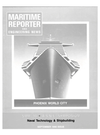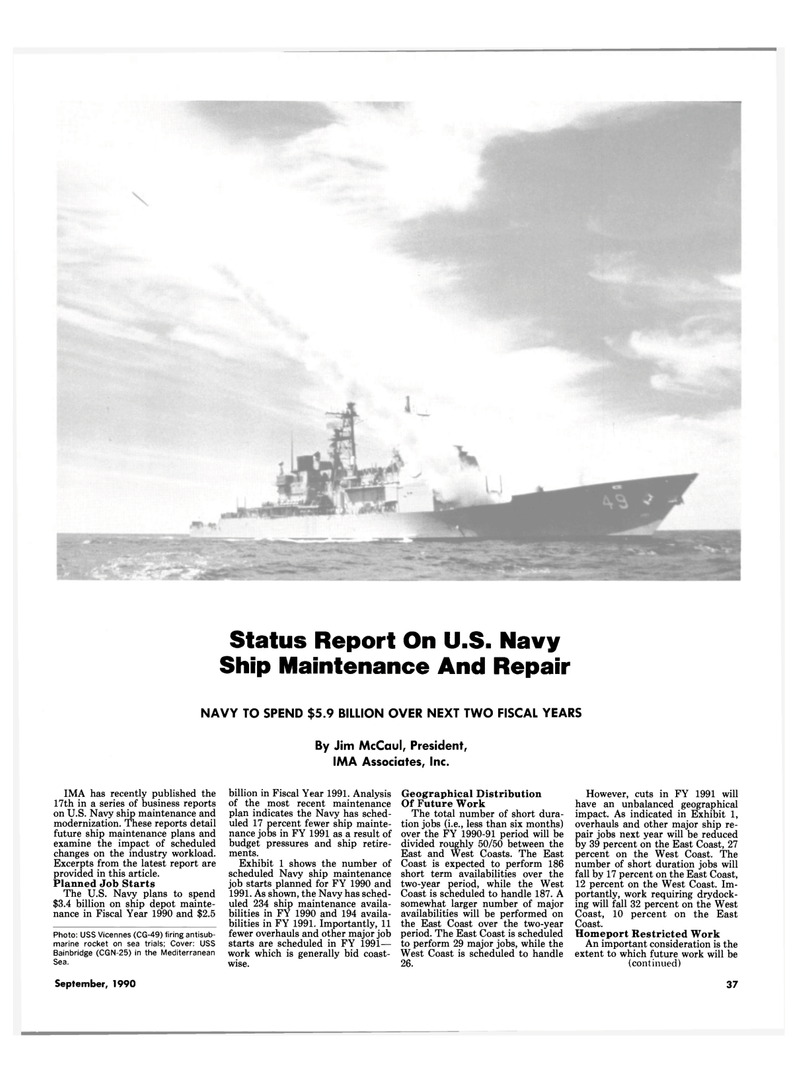
Page 35: of Maritime Reporter Magazine (September 1990)
Read this page in Pdf, Flash or Html5 edition of September 1990 Maritime Reporter Magazine
Status Report On U.S. Navy
Ship Maintenance And Repair
NAVY TO SPEND $5.9 BILLION OVER NEXT TWO FISCAL YEARS
By Jim McCaul, President,
IMA Associates, Inc.
IMA has recently published the 17th in a series of business reports on U.S. Navy ship maintenance and modernization. These reports detail future ship maintenance plans and examine the impact of scheduled changes on the industry workload.
Excerpts from the latest report are provided in this article.
Planned Job Starts
The U.S. Navy plans to spend $3.4 billion on ship depot mainte- nance in Fiscal Year 1990 and $2.5
Photo: USS Vicennes (CG-49) firing antisub- marine rocket on sea trials; Cover: USS
Bainbridge (CGN-25) in the Mediterranean
Sea. billion in Fiscal Year 1991. Analysis of the most recent maintenance plan indicates the Navy has sched- uled 17 percent fewer ship mainte- nance jobs in FY 1991 as a result of budget pressures and ship retire- ments.
Exhibit 1 shows the number of scheduled Navy ship maintenance job starts planned for FY 1990 and 1991. As shown, the Navy has sched- uled 234 ship maintenance availa- bilities in FY 1990 and 194 availa- bilities in FY 1991. Importantly, 11 fewer overhauls and other major job starts are scheduled in FY 1991— work which is generally bid coast- wise.
Geographical Distribution
Of Future Work
The total number of short dura- tion jobs (i.e., less than six months) over the FY 1990-91 period will be divided roughly 50/50 between the
East and West Coasts. The East
Coast is expected to perform 186 short term availabilities over the two-year period, while the West
Coast is scheduled to handle 187. A somewhat larger number of major availabilities will be performed on the East Coast over the two-year period. The East Coast is scheduled to perform 29 major jobs, while the
West Coast is scheduled to handle 26.
However, cuts in FY 1991 will have an unbalanced geographical impact. As indicated in Exhibit 1, overhauls and other major ship re- pair jobs next year will be reduced by 39 percent on the East Coast, 27 percent on the West Coast. The number of short duration jobs will fall by 17 percent on the East Coast, 12 percent on the West Coast. Im- portantly, work requiring drydock- ing will fall 32 percent on the West
Coast, 10 percent on the East
Coast.
Homeport Restricted Work
An important consideration is the extent to which future work will be (continued)
September, 1990 37

 34
34

 36
36
